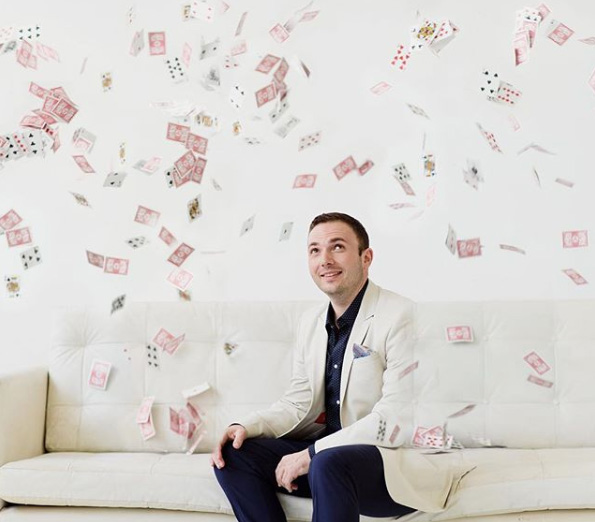Category: Blog
How to Think Like a Magician
Being a magician is more than just being a performer, especially when you take into consideration the tremendous amount of time and effort magicians put into their practice. Every successful magician has a remarkably focused mindset. There is something that every person can learn from a magician.
Illusion of Grandeur or Perseverance?
At 13 years of age, Larry Soffer dreamed of becoming a world-renowed magician. After a great amount of determination and hard work, that dream was slowly becoming a reality. He graduated with a Silver Medallion from the College of Magic in Cape Town. Skip a few years and Soffer is now the youngest South African to be invited to the Magic Castle in Hollywood, a distinguished nightclub where only the most prestigious magicians are allowed to perform.
Magic may be about esoteric secrets and dexterity, but becoming the youngest South African to receive an exclusive entrance to the Magic Castle is no illusion of grandeur. Equipping a magician’s thinking hat will benefit you regardless of who you are and what you do. The differences between your career and being a magician may be significantly different, regardless, you will benefit from Larry Soffer’s magician mindset.
How to Think Like a Magician in 4 Ways:
1) Preparation: The most critical thing to being a magician is perfect preparation. This is arguably the most important characteristic common between all successful magicians.
As mentioned earlier, magic isn’t only about shattering glass and manipulating matter with your mind. Magic involves countless hours of scripting and rehearsing in addition to practicing the necessary skills. As a magician, saying the right word can greatly magnify the performance and thus improving the audience’s reaction as well.
Prepare like a magician. Communicate well, have a backup plan, and practice, practice, practice!
2) Thinking Long-Term: In this digital age, people are so focused on what is happening right here and now that they often forget to effectively plan for the future. Success relies heavily on knowing what your goals in life are and working towards achieving them.
You will never see a great magician use their best effect right away. They work endlessly to create, practice, and perfect their latest effects. As such, a magician sets up their performances carefully; starting with the smaller demonstrations that will wow the audience, to finishing the night with the spectacular finale that leaves everyone wanting more.
It may look like a magician easily and confidently galvanizes an audience into a burst of applause, but in reality the final performance takes a great deal of practicing and setting up to get just right. A magician focuses on how to end their performance as much as they do on beginning their performance. They require an enhanced vision and a clear understanding of what will benefit their performance in the long run; this is what it’s like to have a magician’s patience and future observance.
Think like a magician. Just like a live performance, life doesn’t always go as planned. Learn to adapt to unexpected occurrences instead of instantly giving up; considering the future and planning correctly provides a great amount of flexibility and opportunity to grow and adapt.
3) Adapt and Conquer: Magicians learn from their audiences; they never use the same performance over and over again. They study their audience and adjust their repertoire appropriately.
If something is not working and the magician is unable to improve the specific craft, it will be discarded and replaced. And the most loved acts are constantly improved and polished, because those are the ones that win the audience over.
Learn like a magician. Examine people’s reactions. Find out what your friends, family, and coworkers like and focus on improving that; as a result, you may benefit from a promotion or an improved relationship.
4) Innovation and Imagination: Magicians are constantly coming up with new performance ideas that will shock and surprise audiences. But it’s not as easy as waving a wand, for it requires the use of mental, visual, and physical tools that are often way ahead of our time.
A magician sees existing resources as an opportunity to do something more, to use it in a new and creative way. Moreover, they seek new resources and technologies to improve their shows. If a rope was only used to tie knots and cards were only used for poker, then magicians would have zero tools to work with; they always think of new ways to use existing items and seek out newer items to expand their magic arsenal.
Innovate like a magician: Think outside the box. With a magician’s mindset, you will see everything in a new light. Whether you are a software engineer or a lawyer, a creative outlook will always prove to be beneficial.
These 4 tips are essential in making a magic performance an amazing spectacle. Learning from a magician will assist you in the place of work and at home. Astonish your employer and amaze your friends.
Think like a magician!
Cringeworthy customer service is still a thing in 2018
I consider myself a relatively calm, patient person. To be sure, I do get frustrated, like everyone, but seldom have I been in situations where I felt the urge to really lose my temper. I found myself in such a situation recently, while on a flight with a certain local airline – which I will leave unnamed – and the culprit was something I absolutely loathe: terrible customer service.
A little context
Before diving into the story, I’d like to express why I felt the need to write this piece: poor customer service in 2018 baffles me. In virtually any business category in any country, there are countless companies competing against each other, often vying for the loyalty of overlapping groups of consumers. This is especially true for airlines. You could be forgiven for thinking that, in such an intense and competitive environment, businesses would be hungry for any chance to position themselves as the best in people’s minds. Good customer service strategy, underpinned by effective training for employees, is an essential component of any successful business.
On top of that, we live in the most digitised, connected period in all of human history, with the internet connecting us in real-time with people all around the world. With pictures and video content going viral in a matter of hours, surely businesses are paying attention to the mistakes that their competitors make, and learning from them? I’m willing to bet that most of us can recall stories from friends, family or the media on businesses handling situations with customers less-than-ideally. Businesses today practically have a rulebook for how not to do customer service!
My airline experience
I was in my seat, waiting for the fight to commence, thinking about the details of my upcoming trip. A few moments later, intercom announcements by the pilot and flight attendants hurrying to take their seats signalled to me that take-off was imminent. Once comfortably at cruising altitude, the seatbelt sign went dim, and I found a more comfortable position as I noticed a flight attendant making her way down the aisle, checking the overheard storage compartments.
The attendant finally got to my row and, in an effort to make room for a customer’s bag she was carrying, began shuffling the contents of the overhead storage around. My only carry-on luggage was a small, soft backpack with a few travel essentials and a wine glass that I make use of in a few of my performances. Despite this, the flight attendant roughly shoved my bag to the side, forcing the other one in. Concerned over the fragility of my bag’s contents, I called the flight attendant over.
I calmly explained that while she may have had good intentions, she likely damaged the wine glass in my bag while moving it around. To my surprise, the flight attendant denied being responsible for any damage caused, going as far as to argue with me in front of other customers. Left with little choice, I decided to take it up with management, which I would not have felt the need to do if the attendant had merely owned up. With the manager present, I attempted to explain my frustrations, and the attendant continued to blame me for the damage to the contents of my bag.
This, I thought, would be my saving grace: surely she can’t talk her way out of being rude to a customer! But alas, the manager took no definitive stance on the matter, even slightly favouring her account of the situation. I felt my frustration rising as I fruitlessly tried to appeal to the manager but, before any progress was made, he decided to put the conversation on hold until we landed, advising us to take the matter up in his offices at the airport. Now I was more than angry – I felt like I was being treated like a disobedient child being summoned to the headmaster’s office, not like a paying customer.
I realise that this airline positions themselves as low-cost, saving wherever possible to offer flying South Africans the lower fares, but as I said at the start of this piece, you can’t skimp on good customer service.
I challenge all businesses to focus less on value-added services and technical innovations and to put more time, effort and money into the core basics like customer service, because ultimately, those situations are where you win people over – or lose them forever.
The lasting power of your personal brand
The term “personal brand” is thrown around fairly often. This is understandable: in the digital age, anyone with an online presence has their own personal brand.
The posts and pictures you upload, the websites you frequent and the pages, groups or interests you align yourself with are what your digital footprint is comprised of, and so it is likely that you will have a personal brand, whether you intended to or not.
The most successful businesses are underpinned by strong, universally-understood brands. American author and business executive Seth Godin describes brands as the “…set of expectations, memories, stories and relationships that, taken together, account for a consumer’s decision to choose one product or service over another”, which is also an effective way of defining one’s personal brand.
Personal branding expert Andrew Ford describes it as the unique package of skills, qualifications and character traits that make up who you are. Your personal brand’s essence is captured in the thoughts and feelings that pop into people’s minds when your name is mentioned, so it is easy to see the significance of it, and how it has the potential to be used as a tool to promote yourself, your skills and your career.
The most common personal branding mistakes include a neglect of your personal brand – which results from allowing your personal brand to “just happen” – and brand confusion, when your inability to clearly define what you do or who you are leads to people viewing you as an unspecialised “jack of all trades”, which ultimately undermines your reputation. In this post, we are going to help you reap the maximum benefit from your personal brand with a few insightful tips, empowering you to stand out in your field.
Your appearance
The old saying about dressing for the job you want, not the one you have, rings true here. The way you dress yourself sends nonverbal cues to the people you interact with, and it plays a big part in first impressions, too: having well-ironed, neat clothing might convey your level of detail-orientation, for example. This doesn’t mean you always have to wear a fitted suit, it just means being mindful of your audience and environment, and what messages your attire is sending.
Your point of difference
In a bustling, dynamic city like Cape Town, there will always be someone at your age, in your field, with a better-looking CV or more prominent clients. The trick, therefore, is defining what you offer in relation to everyone else with a similar set of skills or services, and how you do it better. What sets you apart? Maybe you are known for creating stunning visual presentations for new clients before they expect it. Maybe you are known for being incredibly meticulous with data and information. Whatever it is, clearly define it for yourself in written words, and thread it through your interactions and your online presence.
Make promises, exceed expectations
When promoting your own personal brand, great value can be derived from surprising people at every touch point. If you are tasked with researching a competitor brand, for example, you could go the extra mile by not only researching the business but also presenting a list of actionable strategies and recommendations for your employer or client to use.
Manage your image
Whether you like it or not, your online persona will form a significant part of how others perceive your personal brand. In spite of this, many people treat their social media accounts as afterthoughts, sitting with the same Instagram “bio” that they have had for years. The reality is that almost everyone is on social media, from big brands to powerful people, and countless opportunities and connections can come from being proactive on the various platforms.
Prioritise quality
When people are discussing you without your presence, do they talk about what you do? Or do they talk about how well you do it? Being recognised as someone who delivers exceptional quality at every stage of a project or undertaking is incredibly powerful. Whether you’re pitching an integrated campaign to a massive advertising agency or building a website for a one-man startup, maintaining a high-standard of work ensures that people will want to hire with you again, and you are more likely to be recommended to others.
Being proactive in the design of your personal brand gives you control over how others perceive you, and it reinforces your credibility as a professional in your field. As your personal brand grows, people will know what to expect from you before they meet you, helping you make strong, long-lasting first impressions, and ensuring that you stand out from the crowd.
More Than “Blind Faith”: A Blindfolded Larry Soffer Laps Killarney
“It’s very nerve-racking guys, I am very nervous at this moment – but I trust him! I trust Larry.” These were the words of Kfm presenter Ricky Schroeder as he sat alongside Larry Soffer while he prepared for the unthinkable: driving a lap around the Killarney circuit while blindfolded! In 1966, famous mentalist David Berglas performed a similar stunt in London, with the stuntman driving next to iconic British racing driver Graham Hill in the passenger seat. He managed to drive through a small part of London successfully – perplexing onlookers and other drivers in the process – and finished the stunt off by reversing into a parking bay.
The Extreme Festival is an annual event that takes place at Killarney International Raceway in Cape Town. The one-day festival attracts racing fans from all over the country, and it includes a seven-category programme of various cars and races, as well as food and drink stalls, and it was at this event last year that Larry completed the stunt, on the 9th of November 2017.
While readying themselves for the task at hand, Larry asked Ricky to inspect the “blindfold” – which was actually a combination of opaque, aluminium “glasses” and a black fabric bag – to put any sceptics at ease by making sure that both items allowed no visible light to pass through them. Before attempting the lap, Ricky sat in the passenger seat of the Bessie Bester Motors car wearing the blindfold to get a feel for what Larry would experience in the driver’s seat.
Before the start of the lap, Larry spoke to an interviewer about what inspired him to attempt the stunt, making reference to Project Stargate, a series of experiments carried out by the USA’s Defense Intelligence Agency (DIA) which aimed to create “super soldiers” with the ability to “see through other people’s eyes from a distance”, which he also describes as “remote viewing”. The idea behind the stunt was for Ricky to talk Larry through the lap by describing what he sees, helping him to form a mental connection with Larry in the process, which would in turn allow Larry to see through Ricky’s eyes. According to the interviewer, additional obstacles had been set up on the track to further challenge Larry.
The lap started off smoothly, with Larry following Ricky’s instructions perfectly, turning, slowing down and accelerating at his behest. He managed to navigate his way around the traffic cone obstacles that had been set up at random points on the track, in spite of the fact that he found it hard to breathe through the black fabric bag over his head, and after a few minutes in the car he began to accelerate more and more with every passing minute. The sudden increase in speed caused Ricky some understandable panic, with him frantically calling out instructions, but Larry simply said, “don’t say anything. Let me try and do this… just try and trust me”.
There’s no denying that the audience really got more than they bargained for. As the lap came to an end, the two men let out sighs of relief with a few nervous laughs here and there, and Larry finally removed the stifling blindfold. Larry pulled off the stunt in style, exceeding speeds of 120 km/h and stunning the crowd in the process, leaving them with a truly extreme memory from the 2018 Extreme Festival.





